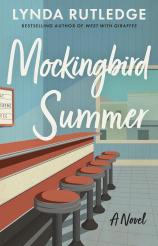Mockingbird Summer
Review
Mockingbird Summer
In Lynda Rutledge’s MOCKINGBIRD SUMMER, the small town of High Cotton, Texas, is on the cusp of change as its Southside (of the tracks) and Northside neighborhoods and implicit Jim Crow laws butt heads with the Civil Rights Era of 1964. We see most of the events through the eyes of 13-year-old Kathryn Kay Corcoran, or Corky as she is known to her friends. Corky lives with her parents, her brother and their beloved pets. Roy Rogers, a large mixed-breed dog, and Goldy, their senior horse, become important to the story, but especially the former, whose unquestioning loyalty and instincts are highlights throughout the novel.
Cal Jr. is Corky's father; his loved ones were sharecroppers on the land of the town’s wealthiest family, the Boatwrights. But Cal Jr. decided to go to college against his father's wishes and now owns the only pharmacy in town. Corky and her older brother, Mack, are expected to work there during the summer. Corky, who describes herself as a tomboy, must wear her Sunday dress while working at the lunch counter.
"This book actually would be an ideal choice for a mother-daughter book club because of its historical nature and the many important themes that emerge.... I think some very productive conversations about race, friendship, ambition, family and literature would result in such a setting."
MOCKINGBIRD SUMMER is unusual in that most of it is from Corky's point of view. Even though the narrative is third person, and a narrator tells us about the history of the town and the other characters, the story is so focused on Corky's perspective that when her brother swears at one point, Rutledge doesn't write out the curse word and instead uses symbols. This struck me as a bit strange for an adult novel, but it also means that the book would not be inappropriate for younger readers.
Corky doesn't understand much of what is going on around her. She has never thought about the fact that the train tracks basically divide the town into segregated areas or that Southsiders never sit at the lunch counter to be served. And when the town's librarian gives her TO KILL A MOCKINGBIRD to read over the summer, she is confused about several events in the story. She asks her mother what the word "rape" means and wonders why the white men wanted to break the Black man out of the jail, and what they wanted to do with him. She couldn’t comprehend why the townspeople believed "the lying white-trash woman over the nice Black man."
During that summer, Corky befriends a Black girl whom she greatly admires. Named America, this 16-year-old newcomer to town can sew beautiful clothes, play the piano and run like the wind. In fact, when Mack times her, they realize that she runs as fast as Olympian Wilma Rudolph. America's mother is working for Corky's mother in order to pay off a loan that Corky's father made to America's father so he could look for work. Over the course of that summer, America integrates the yearly Baptist-Methodist girls' baseball game. Cal Jr.’s lunch counter experiences a sit-in, and he must decide how to respond. And Corky comes to realize what she had not known before in her sheltered childhood: Not all people are treated equally, and just because the color of a person's skin doesn't matter to her, it matters a great deal to many others. America, the girl, symbolizes all that America, the country, could and should be.
Rutledge makes one of Corky's personality traits her incessant curiosity. She is constantly asking questions, many of which verge on impolite during this time. When Corky comments to a journalist that he asks a lot of questions, he responds that it's part of the job. That's when she realizes what she would like to do and be. One of the most beautiful lines in the novel comes at the end, when now-retired journalist Corky wants to write a book. She says, "Because while a journalist's job is to tell what is true, a novelist's job is to tell what is truth, to create a world in which you'd want to live, in which everything is just, even if only in the end."
MOCKINGBIRD SUMMER does just that. We learn truths about Corky, her small town and their values --- the good and the bad. Rutledge is kind enough to let us know about Corky and her brother, and what happens to them in the future. Although she leaves us guessing about America's life, from what she shares about her character traits, we can imagine a rich life filled with beauty.
This book actually would be an ideal choice for a mother-daughter book club because of its historical nature and the many important themes that emerge. There is some violence and several references to drinking, but nothing that a mature middle-grade or young adult reader would not have been exposed to. I think some very productive conversations about race, friendship, ambition, family and literature would result in such a setting. The big question to discuss would be how the participants think the events of that summer shaped the lives of Corky, America and Mack.
Reviewed by Pamela Kramer on February 1, 2024
Mockingbird Summer
- Publication Date: January 30, 2024
- Genres: Fiction, Historical Fiction
- Paperback: 303 pages
- Publisher: Lake Union Publishing
- ISBN-10: 1662504519
- ISBN-13: 9781662504518




